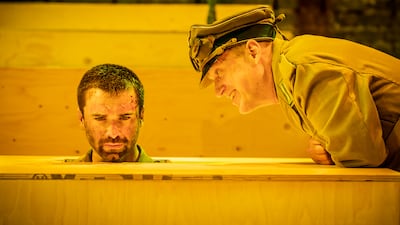When British playwright Josh Azouz first read about the Nazi-occupation of Tunisia during the Second World War, he found the circumstances around it so “absurd and surreal” that he often found himself laughing. Not, mind you, because it was funny, he tells The National from his home in London.
“It was because there was something so brutal about the occupation and its absurdity,” says Azouz. “Nazis with nicknames like Grandma and Memento in Tunisia. It sounded like a Western and I thought it would be interesting on stage using dark comedy.”
The result, Once Upon A Time in Nazi Occupied Tunisia, is a tragicomedy play that explores a period in history in 1943 when formerly co-existing Jewish and Muslim communities in the country were pitted against each other during the German occupation.
Simply yet skilfully staged using plain wooden crates and a suspended shimmering yellow circle, the opening scene immediately evokes a harsh and barren desert landscape.
Out of a hole cut in one of the boxes appears the head of Jewish prisoner, Victor, "buried" in sand up to his ears. His Muslim prison guard, Youssef, is a reluctant hand at the job, simultaneously trying to protect Victor and himself from the German soldiers – known locally as “blonds” – who are ultimately the real threat to them both.

“The Muslim population weren't collaborators in the same way that a lot of the Europeans were," says Azouz. "They'd been under so much colonial rule and the Nazis were just the next colonists and it's a very strange state of mind to be in when you wake up each day and there's a different person in charge. I thought that was so fascinating.”
At the outset of the Second World War, Tunisia was a French protectorate which then became Vichy Tunisia when the Nazis occupied France, and subsequently Tunisia. At the time of the invasion, the country was home to about 100,000 Jews.
While terrorising the Jewish population in Tunisia, the Nazis promised self-governance to the Muslims, wooing some into becoming allies of the occupying power. The complex web of betrayal and alliance that ensues among the different communities is captured through the changing friendship of four characters – Victor, his childhood friend Youssef and their wives, Loys and Faiza.

As Youssef slides into collaboration with the Nazis and fights off his feelings for Victor’s wife Loys, who herself struggles with conflicted loyalties, the unravelling of friendships reflects the societal strains of war and occupation.
It’s this “extreme and surreal” situation of previously co-existing communities suddenly expected to turn on each other that Azouz wanted to dramatise with comedy.
“I read how in one labour camp in Tunisia they kept rotating the Arab guards because they were getting way too friendly with the Jewish prisoners. I just thought that was ridiculous,” Azouz, 35, says.
That’s not to romanticise the time before Nazi occupation, Azouz points out, though he says his own research into this period has yielded starkly different accounts.
“I don't think the Jewish and Arab relationship was a big loving [one], but I think comparatively, it was quite rosy and they sort of just coexisted.”
Raised Sephardic Jewish, Azouz has Arab roots that trace to Syria and Iraq (as well as Turkey and Lithuania) but beyond his father cooing "mashallah habibi" at his grandson, the writer, who was raised in London, says he feels quite distant from his Arab heritage.
“That's probably why I wrote it. Because I wanted to sort of explore it and particularly before the creation of the State of Israel.”
Witty, cynical and darkly funny, the characters’ meaty dialogues raise thorny questions about how and why Israel came to be a country and who and what existed on the land beforehand.
“Regardless of what's going on today, I wanted to dramatise the compulsion and need for Jewish homeland from the Jewish characters' perspectives,” says Azouz, who skilfully builds up the panic and tension felt by Victor and Loys over their decision to leave the increasingly threatening environment in Tunisia, for Palestine.
Conversely, Faiza and Youssef challenge the narrative that Palestine was an uninhabited “backwater country” and pointedly remark to the fleeing couple the contradiction in them leaving one occupation for another.
“The other point is the colonist’s argument and is very difficult for a Jewish audience to hear, I think. So it's those two things that I wanted to sort of prod the audience with.”
Ultimately, Azouz says, all his characters are quite flawed. That’s what makes his play an interesting and authentic take on ordinary life under exceptional circumstances; one in which the messiness of choices and consequences are laid bare on stage.
Once Upon a Time in Nazi Occupied Tunisia is playing at the Almeida Theatre, London, until Saturday, September 18


